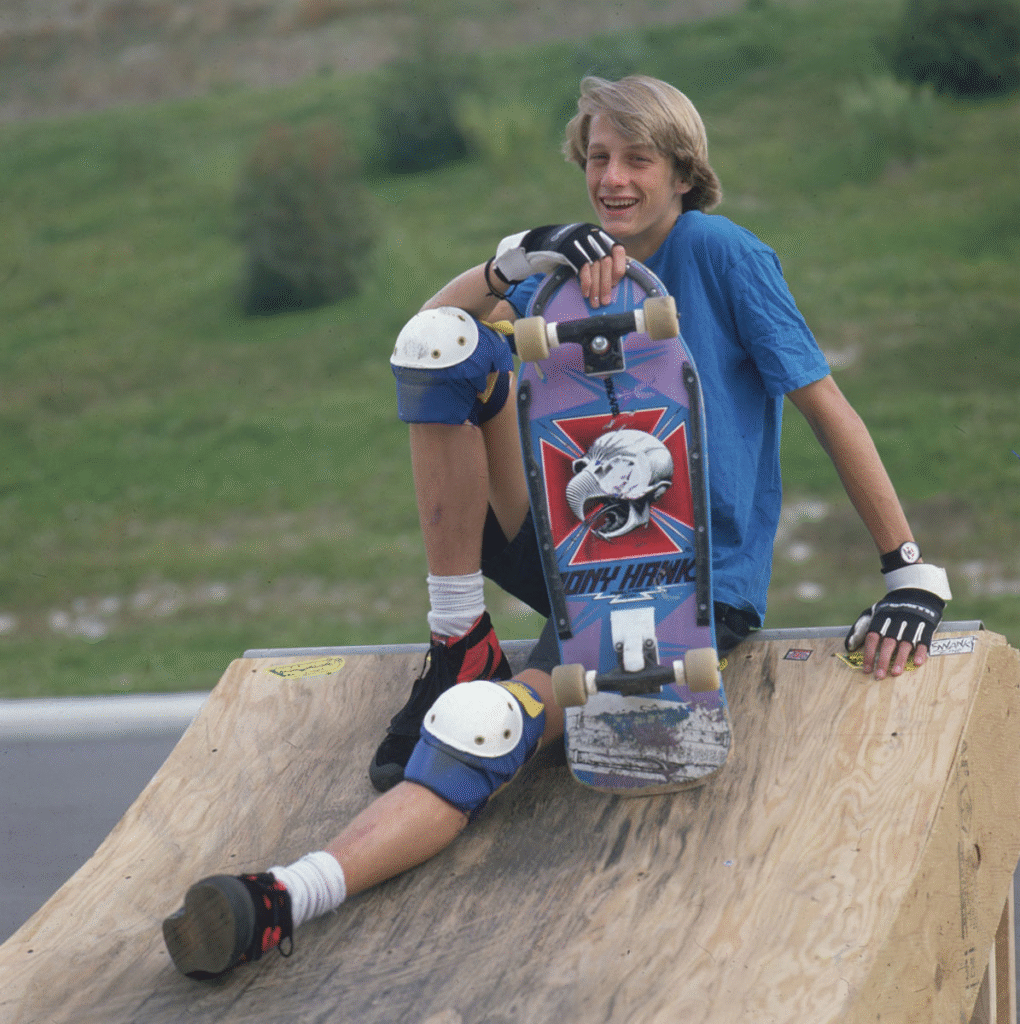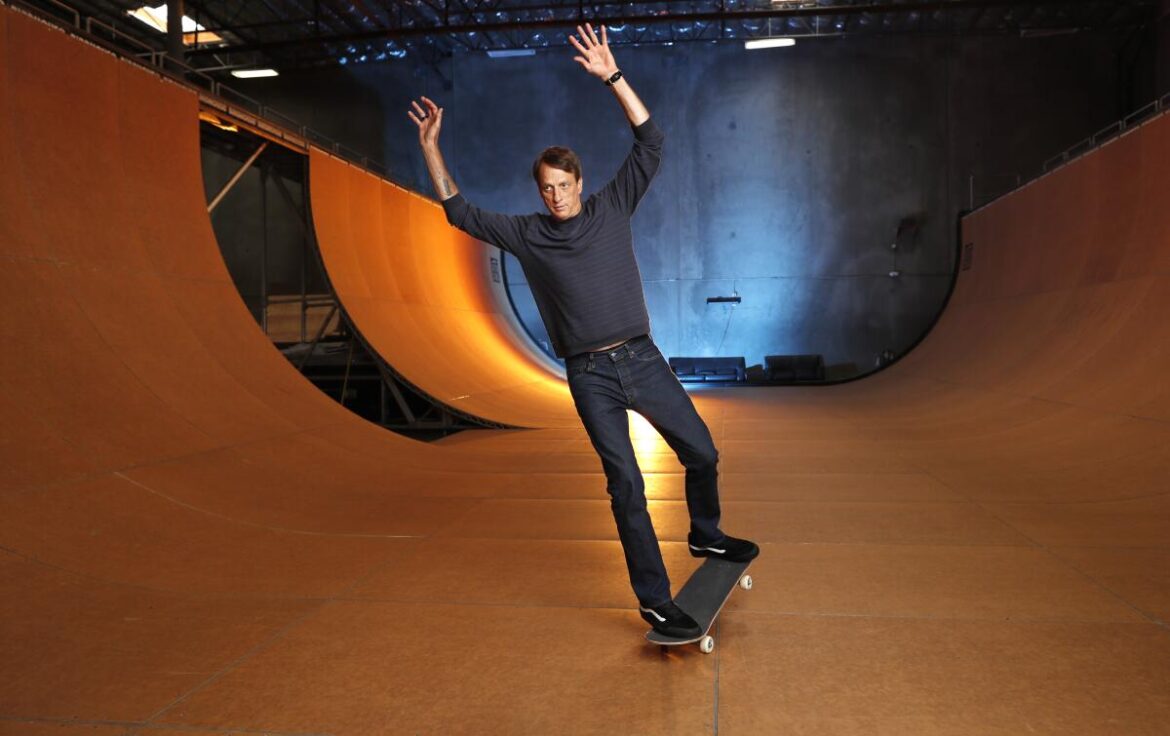Tony Hawk isn’t just a pro skateboarder. He’s a brand, a businessman, and for a whole generation, the reason they ever picked up a skateboard in the first place. The fact that people still ask about his Tony Hawk Net Worth — even decades after his last competitive run — says a lot about his staying power. So, where does he stand in 2025? Tony Hawk Net Worth is estimated to be $140 million, and he didn’t get there by coasting off contest wins. He built that number trick by trick, business deal by business deal, and — perhaps most importantly — without ever pretending to be someone he’s not.
Let’s look at how Tony turned skateboarding into a career most CEOs would envy.
Skateboarding in the ‘80s Wasn’t a Goldmine.
Here’s the thing most people forget: skateboarding used to be niche. Like, niche. If you weren’t in California or reading Thrasher magazine, chances are you barely knew the sport existed.
Tony Hawk started skating at nine. By the time he was 14, he went pro. And not long after, he was considered the best vert skater in the world. That sounds glamorous — and talent-wise, it was — but financially? Not so much.

In the early ‘90s, Hawk sold his skateboards at swap meets to cover rent. He wasn’t broke, but he wasn’t anywhere near wealthy either. His sport just hadn’t hit the mainstream yet. That changed in the late ‘90s, and Tony was smart enough to ride the wave.
The Game That Changed His Life — Literally
If there’s one thing that turned Tony Hawk from skater to millionaire, it was a video game.
In 1999, Activision released Tony Hawk’s Pro Skater, a game that would become one of the biggest sports franchises ever. It was fast, fun, and made pulling off tricks accessible to anyone holding a controller.
Hawk didn’t just license his name and walk away — he signed a deal that gave him royalties on every sale. Within the first few years, he made millions annually and received a royalty check for over $4 million in a single year.
The game didn’t just boost his net worth — it introduced skateboarding to kids worldwide.
Birdhouse, Brands, and Building an Empire
Tony didn’t stop at gaming. Years earlier, he’d co-founded Birdhouse Skateboards, which had struggled in the early days. But once his name blew up, so did Birdhouse. It quickly became one of the most respected brands in skating and remains active today, sponsoring up-and-coming riders.
He also launched Hawk Clothing, aimed at teenagers who wanted to dress like skaters, even if they’d never dropped into a halfpipe. The brand did well in retail, particularly in the early 2000s, helping diversify its income further.
Tony’s real genius wasn’t just in doing cool stuff but in owning it.
TV, Documentaries, and Pop Culture Presence
Even if someone has never played the games or picked up a skateboard, they probably know who Tony Hawk is. That’s partly thanks to his frequent appearances in pop culture.
From The Simpsons and Rocket Power to Jackass and his documentaries, Hawk has always stayed visible — but never in a forced way. In 2022, the HBO documentary Until the Wheels Fall Off gave fans a raw, honest look at his life, injuries, and deep love for skateboarding.
It wasn’t just a PR piece. It proved that Tony’s story still resonates and earned him a new wave of fans.
How He Makes His Money Today
Even in 2025, Tony Hawk is earning — not from coasting on old glory. Here’s how he keeps the money flowing:
1. Video Game Royalties
Yes, people still buy his games. The remastered Pro Skater 1+2 sold millions of copies. With mobile spin-offs and downloadable content, the revenue hasn’t dried up.
2. Endorsements
He’s worked with brands like Vans, Jeep, and Quiksilver — all of which align with his image. He’s careful about what he promotes, which makes him more valuable to advertisers.
3. Speaking Engagements
Companies and universities book Tony to speak about branding, resilience, and building a career outside the box. He doesn’t come cheap, either.
4. Licensing and Merch
From skateboards to clothing to limited-edition collectibles, the Tony Hawk brand continues to sell.
5. Media Appearances
Whether it’s podcasts, web series, or interviews, Tony stays in the public eye — and gets paid.
A Different Kind of Legacy: The Skatepark Project
In 2002, Hawk founded the Tony Hawk Foundation, which eventually became The Skatepark Project. Its mission? To fund and build public skateparks in underserved communities.
The organization has helped create over 600 skateparks across the U.S., giving kids a safe place to skate and be themselves. That’s not just legacy — that’s impact.
And Tony doesn’t just lend his name. He visits parks, meets the kids, and actively helps promote funding and awareness.
Real Talk: Why Tony Hawk Is Still Relevant
Here’s the thing—most athletes fade out once their bodies can’t keep up. Tony broke his femur in 2021, and instead of retreating, he shared his journey of healing. Fans followed every step.
In 2025, at 56 years old, he still skates. He might not pull off 900s daily, but he’s on the board, still trying, falling, and getting up. That kind of grit sticks with people.
He doesn’t pretend to be invincible. He doesn’t act like he’s cooler than you. He keeps doing what he loves — and that’s why his influence (and income) continue to grow.

Final Thoughts: The Skater Who Played the Long Game
Tony Hawk Net Worth — $140 million in 2025 — is impressive. But what’s more amazing is that he earned it by staying true to himself.
He didn’t cash out early. He didn’t try to be something he wasn’t. He took a niche sport, introduced it to the world, and built a brand around it without losing his soul.
If there’s a lesson in Tony’s story, it’s this: find what you love, get good at it, and when the opportunity comes, don’t just ride the wave. Own the board.
Also, Read The Following: Markiplier Net Worth.


